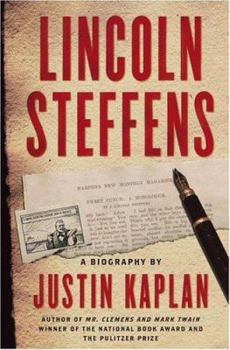Lincoln Steffens
Select Format
Select Condition 
Book Overview
Here, from the acclaimed biographer of Mark Twain and Walt Whitman, is the life and world of Lincoln Steffens -- the Columbus of muckraking, the father of American investigative journalism, and a pivotal figure in the history of grassroots radicalism.Justin Kaplan brings alive early twentieth-century America -- a nation in the throes of becoming a great industrial power, a land dominated by big business and beset by social struggle and political corruption. It was the era of Lenin and Sinclair Lewis, of Emma Goldman and William Randolph Hearst, Teddy Roosevelt and John Reed. It was a time of union busting, anarchism, and Tammany Hall.Lincoln Steffens -- eternally curious, a worldwide celebrity, and a man of magnetic charm -- was part of all he saw: reformism; the progressive movement; organized labor; Greenwich Village's intellectual, sexual, and artistic liberation; the women's suffrage movement; the Russian Revolution; World War I; the Great Depression.Lincoln Steffens was truly a man of his season, and his life reflects his times: impetuous, vital, creative, striving. In Lincoln Steffens, Justin Kaplan holds a mirror to an outsized American figure and to the tumult of turn-of-the-century America.
Format:Paperback
Language:English
ISBN:0743266706
ISBN13:9780743266703
Release Date:November 2004
Publisher:Simon & Schuster
Length:380 Pages
Weight:1.05 lbs.
Dimensions:1.0" x 6.1" x 9.2"
Customer Reviews
1 rating
Revolutionary journalist
Published by Thriftbooks.com User , 18 years ago
This is a great biography of the muckraking journalist Lincoln Steffens who exposed a number of corrupt practices by politicians in many of the large cities in America around the turn of the twentieth-century. Born in San Francisco and educated at the University of California and in Europe, he settled in NYC and began writing for the New York papers. In 1901 he joined McClure's Magazine and with other social critics working there (Ida Tarbell, Ray Stannard Baker) began writing about political corruption in St. Louis, Minneapolis, and other large cities. The articles were a tremendous success and were later brought out in book form, entitled THE SHAME OF THE CITIES. Theodore Roosevelt was impressed by the work of these journalists (at first, anyway) and tagged them "muckrakers," a reference to certain characters in PILGIM'S PROGRESS. Steffens, as Kaplan makes clear, was not just an exposer of political evils or a moralist, but raised more questions than he answered and made the public aware, through irony and other literary devices, of the paradoxes between public life and private affairs. His chief question, as Kaplan says, was "What are you going to do about it?" Later, when exposed to the Russian Revolution in 1917, Steffens became an advocate for communist principles. Losing much of his support in America because of his revolutionary beliefs, he spent much of the 1920s in Europe. In 1931 he published his AUTOBIOGRAPHY, which was a huge success, and he spent the next few years until his death in 1936 lecturing across the country. More than anything else, Steffens wanted people to think seriously about society and politics; he never joined the Communist party: "I am not a Communist," he said once. "I merely think that the next order of society will be socialist and that the Communists will bring it in and lead it." He was wrong about that, and not even Kaplan, writing in 1974, could know just how wrong. He's a beautiful writer, though, and makes his subject interesting and important. It's a delightful biography.





